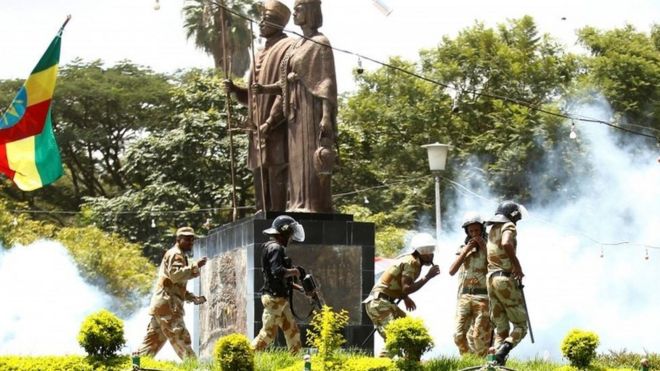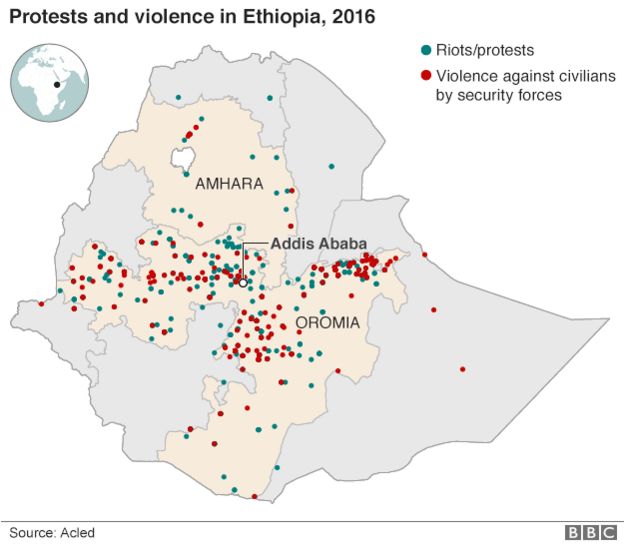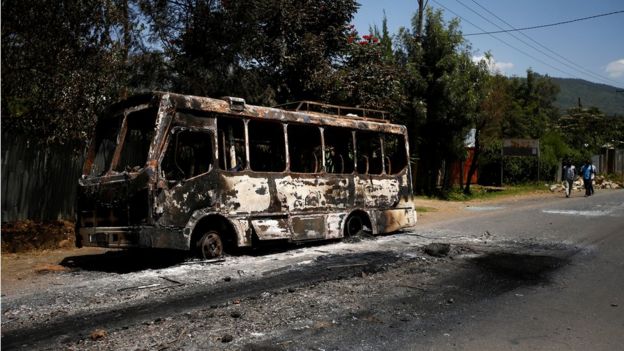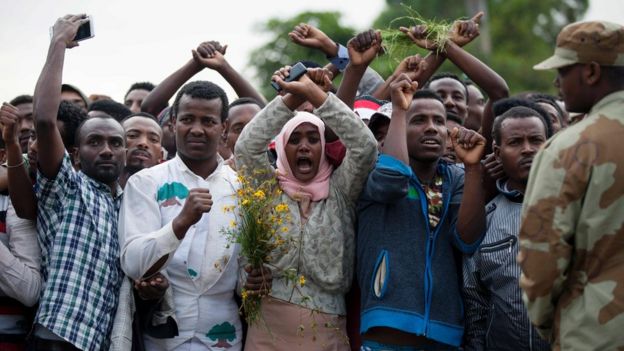
EPDP North America (NA) 4th Congress
15-16 October 2016
On the Eritrean Common National Heritage
Understanding that the Eritrean Nation-State is a large-scale solidarity, constituted by the feeling of the sacrifices that the Eritrean people have made in the past and those that the Eritrean people are prepared to make in the future,
Recognizing the fact that Eritrea is a plural society characterized by diverse social cleavages that go along linguistic, religious, cultural and regional/geographic divisions,
Further recognizing the fact that during the long political evolution of Eritrea as a nation-state, the diverse Eritrean social groups coalesced into one entity in search of freedom, liberty and national sovereignty,
Mindful of the fact that the Eritrean Nation-State is the ultimate realization of the sacrifices of generation of Eritreans in search of nationhood and national identity,
Noting that 1991 is a watershed in the long history of the Eritrean struggle in search of nationhood and sovereignty that should have laid the ground work for the struggle for socioeconomic and political development to ensue,
Further noting that instead of reconciliation, the dictatorial regime has been promoting a process of political and economic exclusion and elimination and as a result chaos and degree of entropy has been increasing with lasting and drastic impacts on the inner-societal stability and the fabric of the Eritrean society,
Cognizant of the fact that there are some elements in the Eritrean Diaspora, who recently have been active in the cyber in the mischaracterization of and delegitimization of the Eritrean liberation struggle,
The North America (NA) EPDP 4th Congress,
Declares that trying to delegitimize the history of the liberation struggle, which is equivalent to insulting and disrespecting Eritrean martyrs and war disabled Eritrean Tegadeliti, is a red line that must not be crossed;
Encourages EPDP to spearhead an intensive campaign to defend and safeguard the legitimacy and righteousness of the Eritrean quest for national identity in general and the liberation struggle in particular;
Urges the Eritrean people to reject the nihilistic and pessimistic attitudes towards the history of the Eritrean liberation era;
Calls upon all elements of the Eritrean society – all Eritrean civil societies, youth groups and political organization as well as prominent individuals, both academicians and religious personalities- to protect, maintain and promote the Eritrean Common National Heritage;
On the conditions of the Eritrean youth and Refugees
Realizing the fact that the youth is most vital and dynamic force of the Eritrean society,
Noting the critical roles that the young play in any socio-economic and political development of Eritrea,
Cognizant of the fact that the youth is the most betrayed and the one, which endures the brunt of the injustices of the dictatorship in post-independent Eritrea,
Further cognizant of the fact that forced labor and indefinite national service are imposed with detrimental effect to its future upon this group,
Recognizing the fact that fleeing the country in droves has become the last resort of the Eritrean youth and yet at the expense of risking its life and in the face of the “shoot-to-kill” policy of the regime;
Noting that the predatory regime in Eritrea is the root cause for the continued influx and displacement of our people, which is resulting in the loss of hundreds and thousands of Eritrean lives across the world,
Recalling that many Eritrean young perished while crossing borders, great deserts, and deep and wide seas and oceans and at the hands of human traffickers and organ harvesters;
Further recalling the fact that many Eritrean young are languishing in refugee camps of their host countries without access to education, training, adequate basic life necessities as well as physical and mental health services,
Appreciating EPDP’s efforts and commitments to the cause of Eritrean refugees,
Recognizing the efforts taken by a number of Eritrean organized groups and individuals to address the problem Eritrean refugees are facing, and mainly Eritrean refugees in the Horn of Africa, Middle East, and in the Mediterranean Sea rim countries who are becoming the victim of human traffickers,
The North America (NA) EPDP 4th Congress,
Encourages EPDP to continue to support the Eritrean refugees and defend the Eritrean refuges’ rights in international forums, including assisting them to obtain political asylum in their host countries or to resettle to a third-party country;
Urges all Eritrean civil societies, youth groups and political organization as well as prominent individuals, both academicians and religious personalities in the Diaspora to understand the uniqueness of the “Eritrean Refugee” and to work to promote the welfare, the humanity and dignity of the Eritrean refugees in their host countries;
Calls upon the host countries to provide the Eritrean refugees with the necessary physical and mental health services, psychological counseling, education and training services as well as legal and communities services;
Further Calls upon the international community, the United Nations refugee agencies, and the host countries to protect and assist Eritrean refugees according to the provisions established in the various refugee conventions and protocols;
Urges the Eritrean opposition forces and civil society organizations to work in unison to get rid of the root cause of the unspeakable plight of Eritrean refugees – removing the Eritrean dictatorial regime from political power;
On the Integrity of Eritrea as a Sovereignty Nation-State
Reaffirming the preservation and maintenance of Eritrea’s sovereignty and territorial integrity is fundamental for Eritrean people,
Recalling that Eritrean people paid heavy sacrifices against successive foreign occupiers for their self-determination, national identity, and national sovereignty that was achieved after a long armed struggle in 1991,
Opposing all threats or use of force against the territorial integrity and political independence of Eritrea, or intervening in its domestic affairs,
Reaffirming the respect of the principles of international law regarding the conduct of relations carried out among states is crucial for the maintenance of peace and security of countries,
Opposing any foreign military or the conduct of foreign political coercion against Eritrea’s political independence and territorial integrity, or its political unity as a country,
The North America (NA) EPDP 4th Congress,
Understands that the preservation of Eritrean sovereignty is a pre-condition to a democratic and prosperous Eritrea;
Declares that Eritrea’s territorial integrity and political independence is inviolable and that Eritrean people have the duty to protect it under any circumstances;
Further Declares that no part of Eritrea or its regions or its ports is to be split from the sovereign and territorial State of Eritrea;
Reiterates support of EPDP policy of decentralization system of government in Eritrea within the sovereign State of Eritrea.
On Unity of the Eritrean Diaspora-based Opposition forces for change
Cognizant of the fact that many of the opposition groups which constitute the opposition camp have roots in the era of the liberation struggle with a legacy of constant splitting and internal feuds and consequently not only are they weak and divided but also they have divergent political and policy orientations,
Convinced that forging unity amongst all Eritrean opposition forces for change is an essential national foundation, which will enable us to remove the PFDJ regime in the immediate term and provides us an opportunity to create a ground conducive for establishing a united and democratic Eritrea in the long term,
Recognizing that unity amongst Eritrean opposition forces for change fosters and lays the foundation for peace and reconciliation among Eritrean people in post PFDJ Eritrea,
Noting that the primary responsibility of achieving unity rests with all Eritrean opposition forces for change and civil society organizations, including the Eritrean public at large,
Emphasizing the significance of taking action now to fulfill our obligation and responsibility on the question of unity is more urgent than ever before, given the deteriorating situation of our country,
Reaffirming once again the political determination and commitment of EPDP on national unity, and the efforts and contributions it has so far made to advance the cause of unity as a fundamental national project is recognizable and on a record,
Further reaffirming EPDP’s stand on unity is consistent with our national principles and values that promote peaceful coexistence amongst our diverse cultures, religions, and faiths, as well as a crucial position that ensures and safeguards our independence, sovereignty, and territorial integrity,
The North America (NA) EPDP 4th Congress,
Calls upon EPDP to continue doubling its effort on achieving unity by establishing a framework that reflects the current state of affairs of the Eritrean opposition forces for change;
Encourages EPDP to continue maintaining mutual understanding and relationships, discussions, and confidence building between Eritrean opposition forces for change in an effort to alleviate the challenges and obstacles we face regarding unity;
Supports the stated principle of EPDP relating to unity: one that calls for the establishment of complete unity/merger between forces whose principles and political persuasions are similar, and the second that calls for the formation of coalition/umbrella within the framework of narrowing the differences through dialogue and confidence building measures down the road;
Calls upon Eritrean opposition members and civil society organizations to consider and address unity as a priority in our struggle and work transparently with a view to playing a positive role and strengthening the pillars of unity;
Urges Eritrean experts and scholars, especially those who have expertise in the field of conflict resolution and reconciliation, to play their professional roles - actively engaging and providing expertise advice through seminars and conferences to Eritreans.
On the Eritrean Diaspora Grass Roots Movement
Recognizing that grass roots movements at the local levels can promote effective leadership and can act as incubators of democracy,
Convinced that the Eritrean Diaspora grass roots movement that became more active during the last two-three years ago is a turning point in the democratic struggle Eritrean people are waging,
Noting that the mushrooming of world-wide grass roots movement is unequivocal demonstration and a strong rejection of the tyrannical system in Eritrea,
Stressing the importance of establishing and creating a world-wide leadership and organization of the grass roots movement,
Conscious that a world-wide leadership and coordination of grass roots movement would contribute positively to a common understanding, and coordinated mobilization and campaign against the predatory regime,
Keeping in mind that the measurable success so far registered by Eritrean grass root movements and the evidence of an increase in public support presents an imminent opportunity for boosting the democratic struggle,
The North America (NA) EPDP 4th Congress,
Reaffirms that EPDP should continue strengthening, supporting and enhancing Eritrean Diaspora grass root movements, particularly in support of establishing local, regional, and international leadership and organization;
Calls upon Eritrean political groups, civil society organizations, experts, and others to give particular and timely attention to the development, cooperation, and guidance of the Eritrean Diaspora grass root movements;
Stresses the importance of mending the intergenerational gap (between the liberation era and the present generation) that exists among Eritreans by learning from each other and acknowledging the diversity of each other’s experience, perspective, and values, and embracing our common values, beliefs and expectations so as to create a culture of inclusion and understanding on how to work together against the tyrannical system of the predatory regime and how to ensure the continuity of our country through cultivating the current and future Eritrean generations;
Further stresses that each generation has a lot to offer to our country’s future, but this would only be productive if each generation engages in a positive discussion and debate aimed at solidifying the struggle against the PFDJ regime and securing the destiny of future generations.
Internal Resistance and Struggle for Democratic Change and Justice in Eritrea
Referring to EPDP’s strategy that the decisive force for change comes from inside Eritrea,
Noting the fact that the internal struggle suffered from an exceptionalism narrative, a political culture dominated by the reminiscences of the liberation era that dilutes the present reality inside Eritrea,
Deeply convinced that the internal struggle is established by sharing and focusing on the attributes of the values (such as national unity, the 1997 constitution, justice, territorial integrity, and relation with Ethiopia...etc) and political culture of the internal forces in relation to the type of change they desire,
Further deeply convinced that establishing an organized resistance and leadership inside Eritrea is crucial with a view to expediting the defeat of the predatory regime, as well as to adopting measures that would ensure unity and peaceful democratic transition in post PFDJ Eritrea,
Fully believing that the majority partners in the internal struggle are ex-EPLF freedom fighters, Eritrean Defense forces, and PFDJ members, including the general Eritrean populace, and emphasizing that the overall influence the internal forces have over the struggle for democracy is critical and decisive,
Noting that the relation between Eritrean opposition and Ethiopia that operates under a structure of lack of transparency erodes the relationship between the internal resistance and the Diaspora opposition,
The North America (NA) EPDP 4th Congress,
Encourages that EPDP adopts a policy statement on how to establish and connect the internal struggle to the outside opposition;
Endorses that the policy statement to identify partners of the internal opposition forces and empower them in a targeted and strategic manner against the repressive regime of PFDJ;
Further Endorses that the policy statement to promote the principle of peaceful and democratic resistance that EPDP advocates for as this guarantees a strong national unity and sustainable democratization process in Eritrea;
Decides that the Party to invest in communication, mobilization, and media that exposes and challenges all facets of tyranny, repression, injustice, and corruption of the predatory regime in collaboration with the internal opposition forces.
On Synchronizing the Inside Eritrea and the Diaspora Struggle for Democratic Change and Justice
Reaffirming EPDP’s position on the establishment of a solid connection between the struggles of the inside and outside Eritrea as its fundamental strategy to effect democratic change in Eritrea,
Further reaffirming that employing different approaches and means of engagement on how to coalesce these two fronts into the same page should be one of the underpinning strategies of the opposition,
Believing that establishing an organized resistance and leadership inside Eritrea is crucial with a view to expediting the defeat of the predatory regime, as well as to adopting measures that would ensure unity and peaceful democratic transition in post PFDJ Eritrea,
Further believing that the key and critical force for democratic change in Eritrea is a home-based democratic forces that can partner with junior Diaspora-based democratic forces,
The North America (NA) EPDP 4th Congress,
Calls upon Eritrean opposition forces for change to formulate and implement a comprehensive action plan, indentifying steps and measures to connect the homeland and Diaspora struggles;
Urges Eritrean opposition forces for change to design and establish comprehensive news and media regime that will enhance, broaden, and raise awareness of Eritrean people on democracy and constitutional governance;
Further urges Eritrean opposition forces for change to use news and media as an instrument for integrated information campaign to expose and undermine the gross and systematic practice of terrorism and intimidation, violence and brutality, and repression being perpetuated by the predatory regime on our people while safeguarding the unity, political independence, and territorial integrity of Eritrea;
Emphasizes once again that the defeat of PFDJ is dependent upon founding a strong resistance organization inside Eritrea, which should be tied and work hand in hand with the Diaspora opposition in order to defeat the PFDJ, in addition to laying ground for a smooth transition to democracy in post PFDJ Eritrea
On the Eritrean Defense Forces (EDF)
Acknowledging that the only organized institution in Eritrea is the EDF,
Further acknowledging that the duty and defense of the country falls under the responsibility of the EDF,
Strongly Supporting the EDF for its continued service in defending the sovereignty and territorial integrity of Eritrea,
Acknowledging that the EDF bears the brunt of the PFDJ repression and injustice, and that it continues to be deprived of its fundamental political and civil rights like the rest of Eritrean people, and that it is among the most impoverished sector of Eritrean society,
Further reminding that the EDF is part of the oppressed Eritrean society under the PFDJ regime, and that it has a national obligation to play its decisive role in the struggle for democracy in Eritrea against the repressive regime of PFDJ,
The North America (NA) EPDP 4th Congress,
Affirms its confidence on the EDF to continue defending the country’s territorial integrity and its political and national unity;
Declares its Solidarity with the EDF in the struggle against the predatory regime;
Calls once more upon the EDF to organize itself and engage in the struggle against the predatory regime.
On The Question of International Relations
Reiterating noninterventionist policy ensures sustainable peace and cooperation between Eritrea and its neighbors,
Affirming the importance of support and assistance of neighboring countries to the Eritrean opposition forces,
Observing the support structure of neighboring countries to the Eritrean opposition forces undermines the independence of Eritrean opposition forces,
Deeply concerned that the current neighboring Countries’ policies contribute to division and disunity among Eritrean opposition forces, damaging the long established harmony and coexistence among all sectors of Eritrean society,
Alarmed at the effects of neighboring Countries’ policies in the Eritrean refugee camps in the Horn of Africa that nurtures tribalism, sectarianism, and regionalism,
The North America (NA) EPDP 4th Congress,
Notes that the interventionist policies of neighboring countries on the Eritrean opposition forces has not been effective, creating many unsustainable splinter political groups unable to accomplish a concrete step towards rallying the Eritrean people against the predatory regime over the last quarter of a century;
Emphasizes the need for neighboring countries to refrain from intervening and managing the internal affairs of the Eritrean opposition forces as an important principle to achieving peace and sustainable relationship between Eritrea and it’s neighbors;
Calls upon the Eritrean opposition forces and civil society organizations to revisit their relationships with would be assisting countries critically in a manner that ensures their independence and ownership of the struggle against the predatory regime;
Supports all the support and assistance from would be assisting countries’ governments anchored on facilitating the democratic struggle of the Eritrean people and promoting unity among the Eritrean opposition forces.
On the Eritrean-Ethiopian Border Demarcation and the Algiers Peace Agreement
Recalling the Algiers peace agreement signed between Eritrea and Ethiopia in December 2000 that ended the border conflict between the two countries,
Further Recalling the establishment of The Hague based Eritrea-Ethiopia Boundary Commission (EEBC) to render a “final and binding” verdict on border conflict,
Reminding that the EU, AU, United Nations, and USA attended the signing of the Algiers peace agreement as guarantors of the agreement,
Further reminding that the border has not been demarcated almost 15 years after the ruling was handed down due to the refusal of the Ethiopian government, and also stressing that the status quo is not sustainable between the two countries,
Realizing that demarcating the border between the two countries contributes to sustainable peace and stability both to the two countries and to the Greater Horn of Africa,
The North America (NA) EPDP 4th Congress,
Calls upon Ethiopian government to honor the Algiers agreement it signed and allow physical demarcation of the border by accepting the “final and binding” clause of the agreement;
Further calls upon the guarantors of the peace treaty to honor their commitment and pressure the Ethiopian government to allow the physical demarcation of the border between the two countries,




























